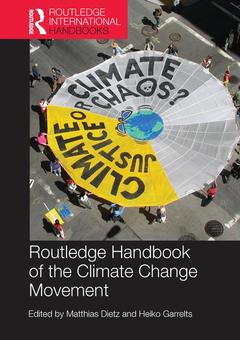Routledge Handbook of the Climate Change Movement Routledge Environment and Sustainability Handbooks Series
Coordonnateurs : Dietz Matthias, Garrelts Heiko

This handbook provides a comprehensive overview of the growing transnational climate movement. A dual focus on climate politics and civil society provides a hitherto unavailable broad and systematic analysis of the current global movement, highlighting how its dynamic and diverse character can play an important role in environmental politics and climate protection.
The range of contributors, from well-known academics to activist-scholars, look at climate movements in the developed and developing world, north and south, small and large, central and marginal. The movement is examined as a whole and as single actors, thereby capturing its scope, structure, development, activities and influence. The book thoroughly addresses theoretical approaches, from classic social movement theory to the influence of environmental justice frames, and follows this with a systematic focus on regions, specific NGOs and activists, cases and strategies, as well as relations with peripheral groups.
In its breadth, balance and depth, this accessible volume offers a fresh and important take on the question of social mobilization around climate change, making it an essential text for advanced undergraduates, postgraduate students and researchers in the social sciences.
1. Introduction: Contours of the International Climate Movement - Conception and Contents of the Handbook Part 1 Theoretical Prospects of the Climate Movement 2. Framing Processes in the Climate Movement: from Climate Change to Climate Justice3. Democratizing the Climate Negotiations System through Improved Opportunities for Participation 4. Antagonistic Standpoints: The Climate Justice Coalition Viewed in Light of a Theory of Societal Relationships with Nature5. The Climate Justice Movement and the Hegemonic Discourse of Technology 6. Climate Justice from the Perspective of Philosophy Part 2 Components of the Climate Movement7. The Green Movement in Britain 8. The Climate Movement in Germany 9. Movements for Climate Justice in the US and Worldwide 10. The Australian Climate Movement: A disparate response to climate change and climate politics in a not so ‘lucky country’11. The Climate Movement in Brazil – Professionalism and Ideological Differences Dörte Segebart und Claudia König 12. India – The long march to a climate movement 13. China's Emerging Climate Change Movement – Finding a Place to Stand 14. Climate Justice In, By and For Africa 15. Activist Profile Bill McKibben 16. Activist Profile Naomi Klein 17. Activist Profile James Hansen 18. Activist Profile Gore Popular Activists 19. Activist Profile Tim DeChristopher 20. Activist Profile Anna Rose 21. Activist Profiles David Spratt und Phillip Sutton International NGOs and Network Organizations 22. Organization Profile Climate Action Network International 23. Organization Profile Climate Justice Now! 24. Organization Profile La Via Campesina 25. Organization Profile Friends of the Earth International 26. Organization Profile Climate Alliance Climate NGOs from the US 27. Organization Profile 350.org 28. Organization Profile Rising Tide 29. Organization Profile Energy Action Coalition Climate NGOs from Europe 30. Organization Profile Plane Stupid 31. Organization Profile GermanwatchPart 3 Arenas, Activities and Development of the Climate Movement 32. Between Pragmatism and Radicalization. NGOs and Social Movements in International Climate Politics33. Re-Framing Climate Change: The Cochabamba Conference and Global Climate Politics 34. Debates and Conflicts in the Climate Movement35. Small Island States and the new Climate Change: the Case of Kiribati 36. Ambivalent involvement: Civil-Society Actors in Forest Carbon Offsets. The case of the Climate Community and Biodiversity Standards (CCB)37. In the Periphery of the Climate Movement – Humanitarian Organizations 38. Conclusion: Results of the Handbook - State, Influence and Future of the Climate Movement
Matthias Dietz is a political scientist at the Centre for Social Policy Research at the University of Bremen, Germany.
Heiko Garrelts is a political scientist at the Research Centre for Sustainability Studies at the University of Bremen, Germany.
The cover photo was taken by Toben Dilworth.
Date de parution : 10-2016
17.4x24.6 cm
Disponible chez l'éditeur (délai d'approvisionnement : 14 jours).
Prix indicatif 66,20 €
Ajouter au panierDate de parution : 12-2013
Ouvrage de 366 p.
17.4x24.6 cm
Thèmes de Routledge Handbook of the Climate Change Movement :
Mots-clés :
Climate Movement; UN; Climate Justice; Climate Change; Conservation; Civil Society; Environmental economics; Can; Environmental policy; Political Programs; Environmental studies; Pro Grams; Sustainability; Climate Justice Movement; Sustainable development; Cop; Political Theory; Indigenous Environmental Network; UN Climate Negotiations; Dimate Change; Climate activists; Dimate Movement; Climate activism; Climate Crisis; Anna Rose; Climate Groups; Tamsin Omond; Della; 350.org; W Orld Trade Organization; Rising Tide; Chinese Civil Society Organizations; Energy Action Coalition; Climate Change Movement; Tim DeChristopher; Plane Stupid; Climate Camps; gegenstromberlin; Ofclimate Change; CJN!; Carbon Trading; Climate Politics; False Solutions; Global Justice Movement; International Climate Politics; Bill McKibben; James Hansen; Al Gore



